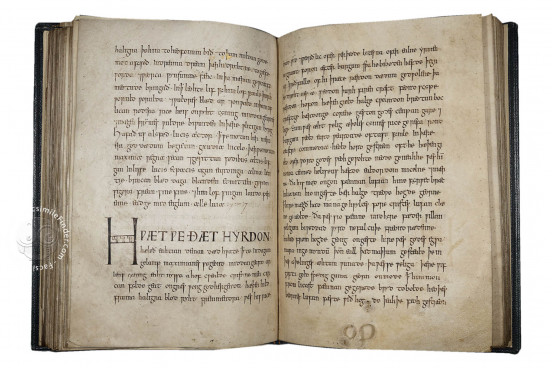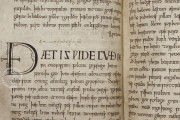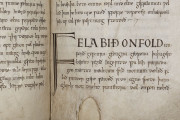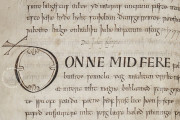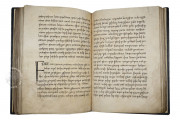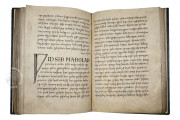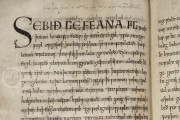The Exeter Book is a treasure of some of the earliest poetic literature written in the English language. It is likely the oldest of the four surviving books of Old English literature. Written in the later decades of the tenth century, the manuscript is a collection of over thirty poems and almost one hundred riddles in the West Saxon dialect of Old English. It was owned by the first bishop of Exeter, Leofric, not long after its creation. Gifted by him to the cathedral, it has remained in Exeter for the last millennium.
Famous poetic works in the Exeter Book include poems like the Seafarer, the Wanderer, two by Cynewulf — Juliana and Christ II —and two works that feature a woman’s voice: Wulf and Eadwacer and the Wife’s Lament. Many of the works in the manuscript are the only extant version and, due to the oral nature of Old English poetry, may be the only copy ever written down. The Exeter Book is the record of the dawn of English literature and holds a vital place in the history of the world.
English Literature from the Transcendent to the Ribald
The Exeter Book contains thirty-four individual poetic and prose pieces and nearly a hundred separate riddles. While most of the poetic works focus on matters of faith, loss, and history, the subject matter of the riddles can be as lofty as philosophy or suggest a risqué double-meaning for everyday objects such as keys and onions.
Although the book’s contents are all beautifully scribed and of literary merit, it demonstrates the broad range encompassed by speakers of Old English for entertainment and education.
Exquisite Insular Script
The large manuscript is written in long lines of twenty-three rows in perhaps the best example of Insular minuscule surviving from the tenth century. Some titles and section breaks are written in half-uncial and full-uncial display scripts, some with decorative elements.
No contemporary illumination survives, and likely none existed, however six marginal figures were added in later centuries including winged angel heads and an inverted horseman.
UNESCO Memory of the World Manuscript
In 2016, the Exeter Book was designated by the United Nations Educational, Scientific, and Cultural Organization (UNESCO) as “one of the world’s principal cultural artifacts” for its place as the largest and likely oldest collection of poetic manuscripts in the English vernacular.
Although its specific origins are unknown, it was owned by Leofric, the first bishop of Exeter, as part of his personal library of sixty-six manuscripts and gifted to the cathedral in 1072. It is the only of these tomes to remain in Exeter since.
Although it has suffered stains, severe burns, and cuts, it nevertheless remains a world treasure in its preservation of the poetry, humor, and faith of the earliest writers of the English language.
Binding description
The current binding is modern brown leather. It was (re)bound in the eighteenth century and this calf binding is preserved in the Cathedral library.
It was certainly left unbound for most of its life as evidenced by damage and wear to the first and last folios and evidence that several folios from the beginning of the manuscript are lost. The original binding may have featured embossed metalwork.
We have 1 facsimile edition of the manuscript "Exeter Book": The Exeter Book of Old English Poetry facsimile edition, published by Lund Humphries, 1933
Request Info / Price
